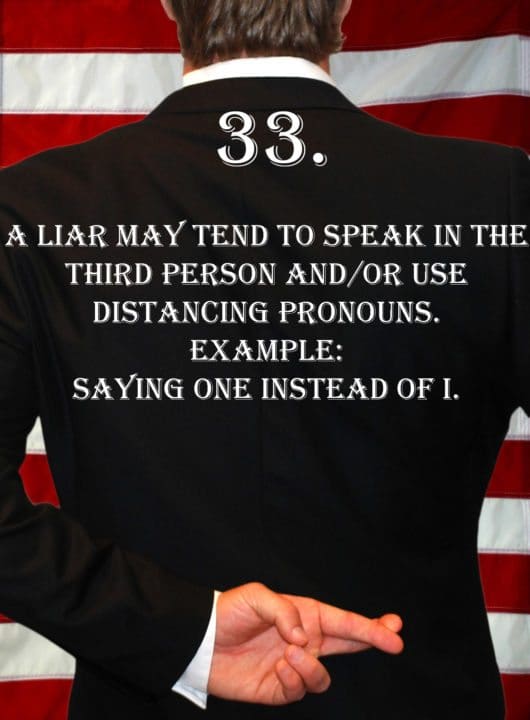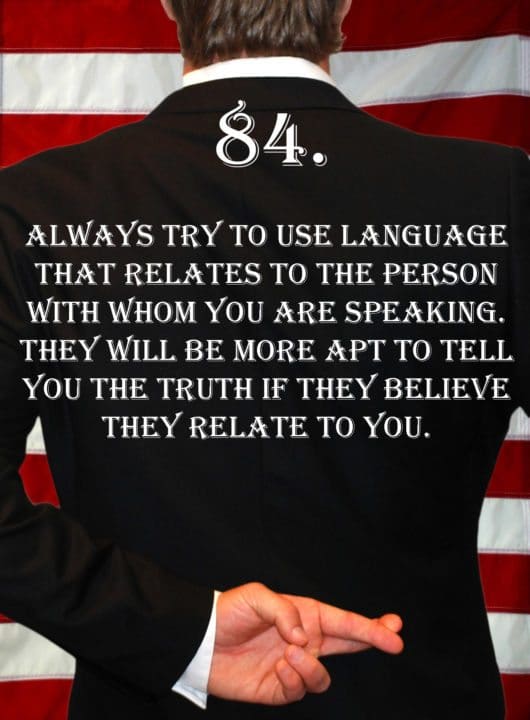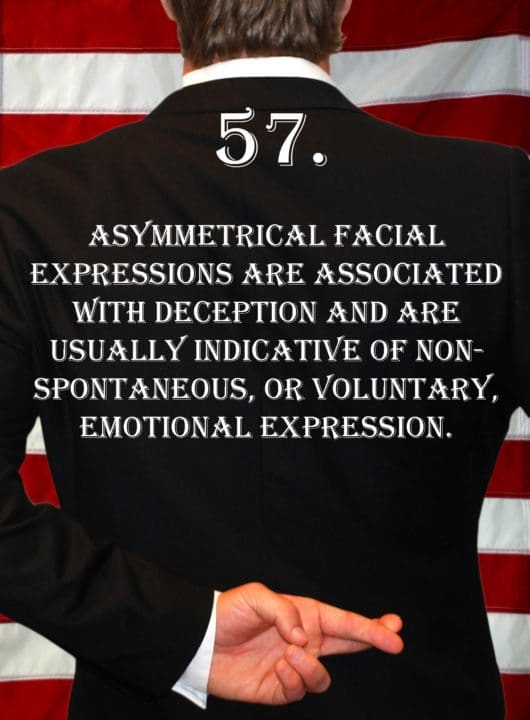
Deception Tip 33:
A liar may tend to speak in the third person and/or use distancing pronouns.
Example: Saying one instead of I.
Listen To The Podcast!
E33 – Third Person – Deception Tips Podcast – Click Here To Subscribe
Podcast Transcript
Hello and welcome to the deception tips podcast where you will learn amazing cues to detect deceit that will help you read people like never before. I’m your host Spencer Coffman, let’s get started.
Welcome to episode 33 of the deception tips podcast. Thank you for your continued listening to this. Hopefully, it is really helping you to learn how to read people and detect deception so that you will never be lied to again. Of course, you’re going to be lied to.
However, this is hopefully helping you to be able to spot those lies and detect deceit so that you will not be fooled. At any rate, we are continuing to talk about these, we’re moving on through we’ve got a hundred and one deception tips, this is episode number 33, so we have quite a few more to go.
Last time we spoke about a sign of deception that isn’t directly witness-able. It is a sign of dry mouth, so you can’t really see that someone has a dry mouth. However, you can see the results and the effects of dry mouth which is frequently licking the lips and that’s what we spoke about last week.
Now, the thing to remember with that is that when people lick their lips there could be a variety of causes. Maybe you’ve put down a nice plate of food in front of them. Maybe there is a sour pickle right there and usually when you have a pickle, or you hold the pickle in your hand or mustard or something your mouth kind of starts to water, and then, of course, you lick your lips. Try it, it’s a cool experiment.
Otherwise, there might be some environmental factors. Maybe you’ve introduced a lot of stress and tension causing them to have a dry mouth from that fight or flight response and now they lick their lips.
Or, it could be something else like drugs or chemicals, or they’re either on some kind of a drug, prescription or otherwise, that causes them to have dry mouth, then they lick their lips.
Again, in wintertime, chapped lips, might lick their lips, a lot of different varieties, a lot of different factors that could go into it. So, like anything, the more variables you can control, the better off you’re going to be at detecting deception and knowing whether or not someone is lying to you.
So, that is the key right there, if you can detect that and you can kind of control these variables. You look for the reasons why these behaviors might be happening rather than simply pinpointing a behavior with a certain form of result or with something that is a certain meaning then you’ll be able to think more critically about it and reason and rationalize the purposes behind these behaviors.
In addition, always watch for the patterns and clusters of behavior because by watching for those then you’ll be able to confirm your suspicions over and over again. Then you’ll really know whether or not someone is lying or whether or not they are telling the truth.
Today, we are going to talk about another sign of deception. This one is related to speech and it is something that has been brought up before. We talked about it a long time ago with a different form of deception and that was back in episode number 18 when we talked about distancing language and how people may speak in a language that distances themselves from the situation.
We used a popular example of a politician who called somebody that woman. So, if you don’t remember I encourage you to take a listen to number 18. Because the person we were speaking about was famous Bill Clinton and his Monica Lewinsky scandal where he referred to her as that woman in an attempt to distance himself from that situation.
Now this happens all the time when people distance themselves and I went over a lot of examples of why it might happen and what the case may be. But basically, they do not want any association between them and whoever or whatever is in question.
Today, we’re going to talk about something related to that. However, instead of talking about someone else, they are probably going to be talking about themselves.
So, here it is, this is deception tip number 33. A liar may tend to speak in the third person and or use distancing pronouns, for example, saying one instead of I. Here it is again. A liar may tend to speak in the third person and or use distancing pronouns, for example saying one instead of I.
Now, this is interesting because what it means is that distancing pronouns are about the person. So, when we talk about distancing language, it was referring to that person to another person such as I would never do business with that place. I would never be associated with that establishment or I did not do well x y z with that woman or that person or we were never seen together.
Now, that would be a normal thing, we were never together because you used, we and together. However, if it was a distancing language, I would never be seen with that person. So, instead of saying we, they used I, talking about themselves, separating themselves, and then they use that person instead of together separating again.
So, that is the case with distancing language and that is exactly what’s going on when liars talk about themselves in the third person. They do not want to be associated with whatever is going on, whatever they are trying to lie about. So, usually, that means they’ll speak in the term one instead of I.
So, one would think that when going down to the store this would happen instead of well, I would think that it would be like this. They use one to separate themselves from that situation typically because they may have already been involved in that situation. So, now if they admit that they’ve been involved in that situation, then it puts a little bit more accusation on them or a little bit more suspicion on them.
Whereas, if they use distancing language and say well one would never do this one should never do that, or one would think that this would be the case. Those types of speech patterns or language or third person language are usually done to separate someone or oneself from that situation. Anytime someone is trying to separate themselves from a situation, the question is, why?
Did they have some kind of relation to it or do they just not like it? There are a lot of questions that can be asked and answered relating to that and we can talk about the distancing of oneself from a situation and why one may or may not use third-person language. We’re going to talk a lot more about it coming up after this.
Do you ever wonder if that smile from the person you’re interested in is sincere or is it merely polite? Spencer knows. He’s published groundbreaking research on smile detection and his books can give you more insight into what that person is really feeling.
Most people don’t speak in the third person regularly. Sometimes books are written in the third person, which means that it’s being told from another perspective. Now, that is the key, a third person is usually another perspective, it’s being told from an outside View.
This is why most of the time when people speak, they don’t speak in the third person because whenever you tell a story about yourself, you’re telling it from your perspective, you’re telling your story.
So, if you decided that you are going to tell someone what happened yesterday. For example, yesterday I went down to the parking lot and I had to park my car, the lot was full, so I parked in a different spot.
I was only there for five minutes and I came out and there was the guy writing me a ticket. I said, hey, I’m leaving don’t be writing me a ticket, he said, too late, I already have it filled out, so that’s your story.
Now, if I change that and say, well, one who would park in the lot would usually park their car in a normal space but if one didn’t have room in that lot, I suppose they would park their car in a different place and if they were only in there for five minutes, why would they get a ticket, and it sounds goofy. I mean, it’s just a little bit backward, using that third-person language to tell a story about yourself.
This is the first thing you’re going to see, you’re going to start to notice that when they’re telling an experience or telling a story it doesn’t sound natural, it doesn’t sound like a normal narrative. It sounds like it’s about some fictitious person or it’s about someone else because it’s not directly about them from their own perspective, so that is a little goofy.
Now, why would they do this? Well, as we’ve said before, they would do this as a form of distancing language, as a way to separate themselves from that situation. Maybe they’re talking about how they wouldn’t have a parking ticket, or they said that their driver’s record was clean. Someone brought up parking tickets and then they would give an example in the third person relating it to a general population rather than their own experience.
So, that way that person was asking him would still believe that they have that clean driver’s record. However, obviously, they could look it up and find out later, but that’s beside the point. The point is that they use this distancing language to separate themselves from the accusation of a parking ticket. So, that’s one way to distance, another way separation, to be apart from whatever was going on.
Then another reason they could do this is to shed the blame. So, if they’re talking about a certain situation that they don’t want to be associated with for fear that it might seem like it was their fault or like they did something wrong like it was a mistake they made.
So, this is most typically witnessed at work when someone screws up at a work job or doing some form of a job and the boss comes down and is saying, well, what’s going on? Why is it like this? How do you do x y z?
Then the person starts speaking in the third person language explaining how someone should do this not how they would do it because they already know that they messed up.
So, rather than directly lying and saying well, here’s how I would do it and saying the right way and not acknowledging their mess up, they speak in the third person to almost like feel more comfortable with telling the lie. Like they’re talking about someone else but they’re hoping that the target assumes that they’re referring to themselves so that they don’t get caught in a lie. It’s a way of telling a lie indirectly, like a half-truth but it’s still a full lie.
So, they’re telling this lie indirectly by speaking about someone else hoping that the target will think that they’re talking about themselves, and then dismiss the situation. Usually, this isn’t the case though, because oftentimes people are like wait a minute, what in the world is going on? I don’t have any idea why you’re speaking like this when normally you simply talk in the first person.
Most people talk in the first person anyway, so as soon as someone starts to bring up the third person, that becomes convoluted and hard to understand and it’s very confusing. So, people really don’t like it and then obviously suspicion is even higher because normal people don’t talk that way.
So, another reason that they would use this third person is like we said, it sums it all up to ward off the accusation or the association with whatever is being discussed. So, it’s basically whenever people talk in the third person, they have a number of objectives. Number one is they are usually trying to tell some form of lie.
Now, this is if they are a liar because obviously like we said they can tell stories in the third person, books are written in the third person. But when it pertains to deception, the third person is normally used when someone has a lie to tell, and the reason, they use it is to distance themselves from whatever the lie is about. So, whether that’s a person or a situation or an event.
In addition, they want to separate themselves from that event. So, distancing as in distancing language and then separation as in that’s a mental connection. So, the distancing language helps to form the separation in the target’s mind. Then they want to shed that blame on themselves onto just a general way of doing things or on no one at all.
Then that Association of themselves with that particular event or person or scenario is something that they want to avoid which is why that third-person language comes into play. Their goal is ultimately to get away with the lie, so however they do that, that’s going to be up to them, but they are trying so hard to convince not only themselves of the lie but also the target of the lie.
They’re using these different methods to try to convey that, so this distancing language is a method to convey that. It’s one that you’re going to notice right away because it sounds weird, it sounds different. So, if you pay attention to that then you can start asking more questions and watch to see if they convert between first-person and third-person language.
If they do, then you know something’s up because that means that the third person language was probably rehearsed just like any other rehearse story. Again, we spoke about rehearsed stories a long time ago back in episode 15. When people rehearse the stories if you poke holes in the story, oftentimes they haven’t prepared those responses.
So, when you have someone who’s using this distancing language in the third person and you can poke a couple of holes in their story or ask him some detailed questions about it. If they switch back to the first person as in telling their experience because they haven’t prepared those answers in the third person, now you’ve really got them because now they’re contradicting themselves. You can really flip them up very quickly.
So, I want to thank you for listening to the deception tips podcast. Make sure to share with your friends, subscribe to the feed, watch the videos, check out the deception tips blog, take a look at the books I have available, and tune in next week for a new deception tip.
Video Transcript
My name is Spencer Coffman, thank you for watching the deception tips videos. They’re all about teaching you how to read people and detect deception so that you will be able to tell if someone is lying to you.
Today, we have a very cool tip to talk about, it is something that people often use without even knowing that they’re using it. They are talking in a normal conversation, it can come out and in abnormal conversation or lying, deceptive conversation, they can have it as well. So, this today is deception tip number 33. A liar may tend to speak in the third person and or use distancing pronouns, for example, saying one instead of I.
So, liars like to speak in the third person because it separates them from the situation. We talked about this way back in video number 18 when we talked about distancing language. Again, we have a podcast that goes with it, it was also number 18 or on the deception tips blog, it was blog post 18.
Anyway, number 18, we talked about this before with distancing language, how people would say, “well, I would never do business with that person or I would never establish with that person.” One popular politician used that in his defensive line and it’s all over on YouTube. You can type it out with ‘that person’ or ‘that someone’ he said, and he used distancing language to separate himself from that situation and try to cover up a lie.
Now, people use that all the time and it’s not only when they’re lying, but it could also be when they don’t feel like they’re a part of a group. For example, if someone recently comes on to a board meeting or a new job and they may start saying things like, “well, you guys” or “you”, they haven’t quite identified with the group yet.
Until they start saying things like ‘we’ or ‘our’ or ‘at our job’ or ‘our employment’ or ‘our group’, things like that. So, watch out for that with new people that join groups, you want them to feel a part of it, so they shouldn’t be using distancing language. Watch out for people who are lying, they will use distancing language.
Today, speaking in the third person is a part of that distancing language, for example, saying one instead of I. So, they would say, “well, one would think that when you go down to the grocery store, you would take this road and this road instead of these roads.” Well, why not just say I would think that or normally you would take these roads instead of these roads, it doesn’t quite sound right.
When people talk in the third person about something that is happening in their life, it doesn’t make sense. They’re not supposed to be talking in the third person because it’s happening directly to them. The only reason that they switch it to the third person is either because, well, they’re an idiot or because they want to sound smarter or because they’re lying.
So, there could be a variety of reasons just like any of these deception tips, there’s always a number of reasons that any of them may happen. When speaking in the third person, unless someone is telling a story and the third person is a valid form of language or speech to happen in that particular instance, then it really doesn’t belong, it doesn’t belong there. So, that means it’s out of place, it’s abnormal.
Therefore, if it’s abnormal, then you should pay attention to it because usually, anytime that you encounter something that’s abnormal, whether it’s with speech, body language, facial expressions, behaviors, contradictions, any of those, how they work together. Anytime that you see something abnormal with that, it means that you need to pay attention to it because that’s a sign, it’s something that’s coming.
So, if you watch that and determine if there are any other abnormal signs happening in conjunction with those, you’ve started to see a pattern and a cluster of behaviors, which could be very indicative of deception or that that person is not telling the truth. They may be either flat-out lying or they may be withholding something.
That is up to you to discern from the situation and investigate and prod further but anytime you see one of these signs, that’s a warning. You can investigate and dig a little deeper to determine if it was nothing or if it is something. That is all up to you and that is why these videos are so important.
So, if it is this your first time watching these videos, I would love to have you subscribe to the channel on YouTube. Also, we’ve got tons of information available on spencercoffman.com. We have books, blog posts, podcasts, all that stuff, a hundred percent dedicated to teaching you exactly what everybody is really saying.
Until next time.






